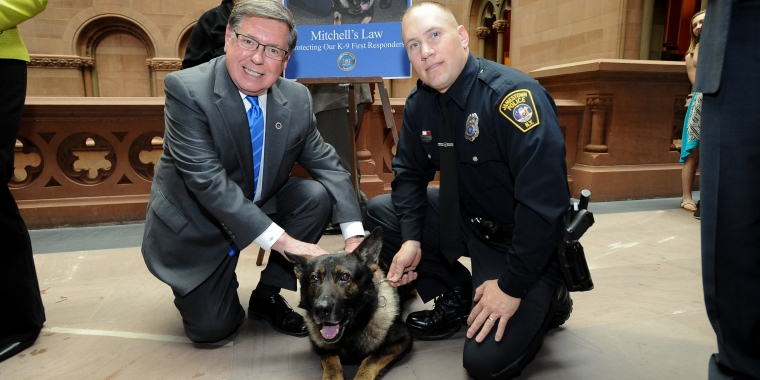
Senate Passes Mitchell's Law
Jeff Bishop, Communications Director
May 16, 2017
-
ISSUE:
- Police
- law enforcement
- K-9

ALBANY, 05/16/17 -- State Senator James L. Seward (R/C/I – Oneonta) today announced senate passage of legislation he co-sponsors which increases the penalties for killing or injuring a working police dog or police horse.
“Police animals serve and protect just like their human counterparts, and in many cases they are the first line of defense in a hostile situation,” said Senator Seward. “We must make certain that when a criminal injures or kills a police dog or police horse, an appropriate prison sentence is the result.”
Senate bill 961 sets the penalty for injuring a police dog or police horse as a class E felony and increases the penalty for killing a police animal from a class E to a class D felony.
The legislation, known as Mitchell’s Law, iss named after Jamestown Police Department K-9 Officer Mitchell, a six-year-old German Shephard who was seriously injured during a confrontation with a suspected murderer. K-9 Mitchell was stabbed in the throat and under his jaw and underwent emergency surgery for his injuries. Because the wounds suffered did not result in death, the suspect could only be charged with a misdemeanor related to the stabbing.
“Thankfully, K-9 Mitchell is a back on the job, however, the criminal who brutally stabbed him deserved to be charged with a serious crime. This legislation will ensure that going forward, the punishment for injuring a police animal fits the seriousness of the crime,” added Seward.
Senator Seward has been a strong supporter of protecting police animals. In 2013, legislation he co-sponsored making it a felony to kill a police animal was signed into law.
“I was a longtime co-sponsor of legislation to increase the penalty related to the killing of a police animal. The legislation received a major boost when FBI K-9 Ape gave his life to protect others during a tense standoff with an armed killer in Herkimer. Mitchell’s Law will further extend these protections,” Seward concluded.
Companion legislation (A.6737) has been introduced in the State Assembly.
-30-


